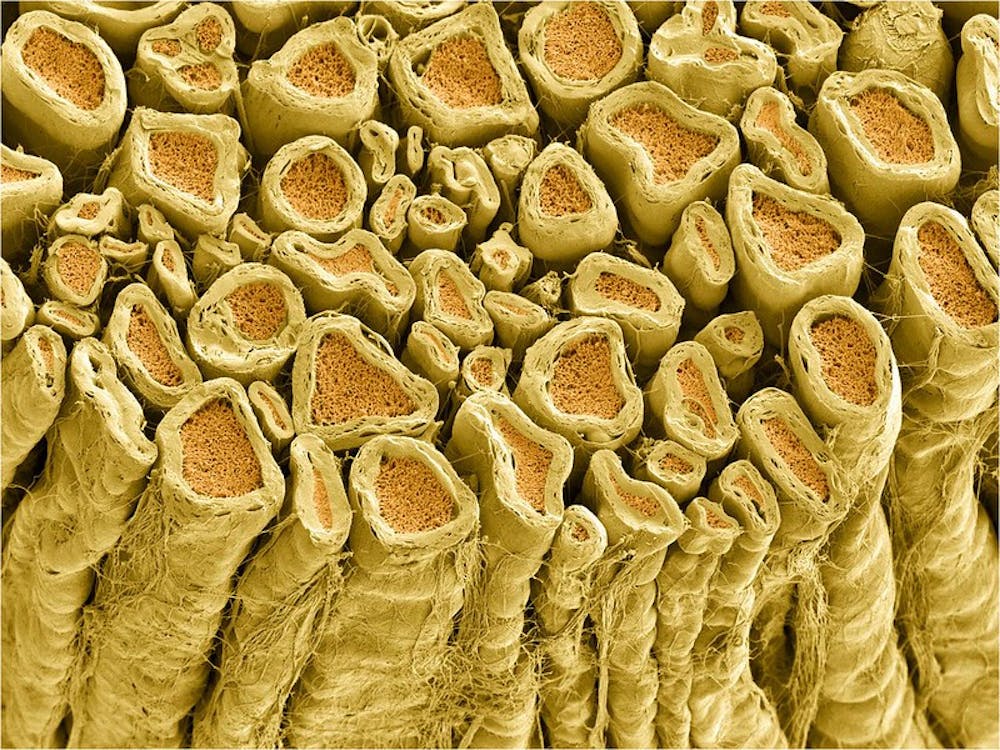
While immunology fascinated him in high school, when Saahith Potluri entered Hopkins, he had no intention of continuing his research interests past college. Now, with graduation only weeks away, he is determined to keep his work alive in the next chapter of his life.
For the past two-and-a-half years, Potluri has worked in the Calabresi Lab which studies possible treatments for Multiple Sclerosis (MS). MS is an autoimmune disease of the central nervous system that causes neuron inflammation and destroys the myelin sheathes protecting them. As MS progresses, it can result in extreme fatigue, muscle weakness, loss of motor skills, loss of vision and numbness, among other symptoms. It is the most common disabling neurological disease for adults ages 20–40, and there is currently no known cure.
Potluri’s work has primarily focused on NLRX1, a protein that has been shown to have an anti-inflammatory effect in combating other chronic illnesses including Parkinson's and GI disease. The lab hoped that it might have a similar effect in treating patients with MS. Using mice models with Experimental Autoimmune Encephalomyelitis (EAE) — a commonly used model for MS — Potluri analyzed neuron inflammation and degeneration in mice treated with NLRX1.
Potluri explained his findings in an interview with The News-Letter.
“We hoped to see that NRLX1 inhibits two aspects of MS. One was neuroinflammation — inflammation in the brain and spinal cord — and the second was neurodegeneration — the death of neurons in the brain and spinal cord. We found that NLRX1 does have a protective effect on nerve degeneration, so it actually might work to stop neurons from dying in the mice, but we found that it might not affect inflammation,” he said.
Potluri’s involvement with the Calabresi Lab began as a freshman when he reached out to several immunology labs, hoping to find research opportunities. While he wasn’t initially interested in working in a wet lab, he was drawn into it by an intellectual curiosity sparked by Marjan Gharagozloo, then a postdoctoral fellow in his lab.
“I went to the lab and wasn't expecting much out of it. But how she talked about immunology convinced me that there's a lot of learning to be done here,” he said. “She gave me an immunology textbook and said, ‘Take this home and read it.’ I went home, read the book and some papers she sent me, and I was interested. I didn't do any of my homework that night because I was just reading that. That made me go to the lab the next week for another meeting and then I eventually joined the lab.”
While he fell in love with the work, he has learned first-hand the difficulties inherent in undergrad research, lack of knowledge chief among them. He explained that he felt doubly challenged having to both learn the biology of MS, a topic he knew nothing about before joining the lab, and needing to develop a researcher’s mentality to receive unexpected results.
“When you're collecting data, more times than not you look at a screen and think ‘What am I looking at?’ You have to sit down with your postdoc for hours to discuss what this means and what to do next,” he said. “Getting unexpected data, not necessarily bad data, that might mean something new or nothing at all, and trying to piece it together… is the most challenging thing, because it takes so much patience and courage to move forward with the next experiment.”
He noted that overcoming these obstacles was a key component of the dynamic nature of research which, while slow, consistently demanded that he think in new ways.
Among the opportunities afforded to Potluri through his work, was the ability to present his findings at the 2024 Stanford Research Conference held from April 5–7. The conference brought undergraduate researchers from across the nation to Palo Alto to network, learn and share their work.
For Potluri, the conference offered an opportunity to reflect on the last two years of his professional life.
“The entire experience of presenting what you had to offer and then listening to everyone else was really fulfilling. I was definitely nervous the morning before [the poster session], but then I when it started, I looked at my poster and found a lot of comfort in seeing the same figures and data that I’ve looked at for the past year,” he said. “It made me feel closer to my work [and] the work of the lab. I am thankful that my PI and my postdoc allowed me to come out here and present this.”
With the end of his undergraduate career at Hopkins fast approaching, marking the end of his time in the lab, Potluri reflected on the significance of his research career. He explained that after conducting research for two years, he is determined to maintain his skills in medical school. More importantly, he shared his feelings on saying goodbye to such an integral and transformative part of his college experience.
“Leaving a place you've spent more than half a week in for the past two years is bitter, but it fills you with gratitude to leave this place, knowing that this place and these people will keep chugging on long after you're gone,” he said. “I’m just grateful that I was able to be in some way, shape or form a part of this for such a small amount of time but able to impact it in some way. I am grateful for the people who taught me these things and accompanied me throughout this process and made me into a better person and a better scientist.”





